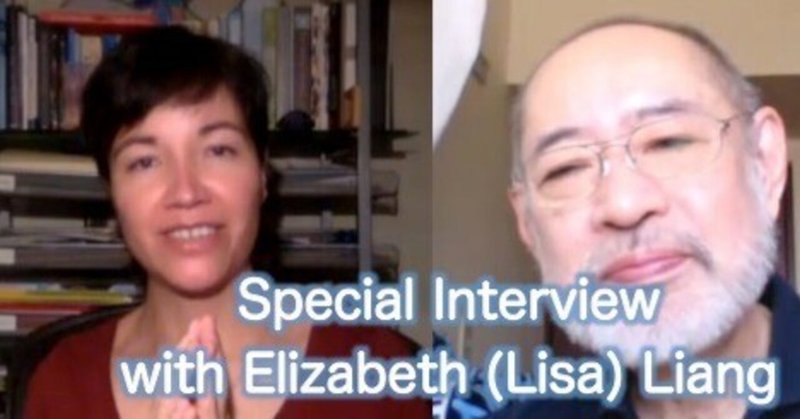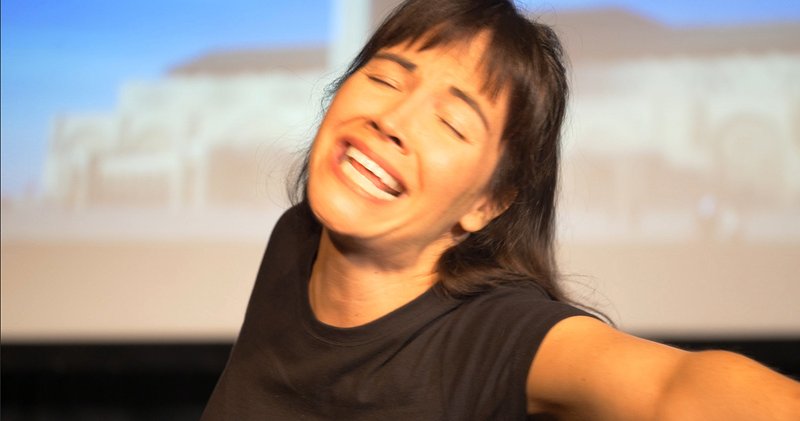
Telling Your Own Story
Special Interview with Elizabeth (Lisa) Liang
by Atsushi Furuiye
The Interview was conducted in English.
Japanese version is here.
All photographs from Elizabeth Liang in Alien Citizen: An Earth Odyssey,
© HapaLis Prods.

"Alien Citizen—An Earth Odyssey" is a solo theatrical show now available in video, written and performed by Elizabeth (Lisa) Liang. Born to a Chinese-Guatemalan father and an Irish-European-American mother, she was raised living in a variety of continents and nations. The show is about her own global journey.
As soon as Lisa appears on stage a thunderous voice asks her, "Who are you? Where are you from? What are you?" In an attempt to answer the questions, she starts to tell the stories of her life: The happy childhood in Latin America, the difficulties she experienced as a girl in a North African Muslim country, the alienation she felt returning as a college student to her supposed home, the US, etc., etc.
The numerous experiences of moving across borders nurtured in her some ways to cope with the cultural/linguistic differences as well as some tendencies to face the constantly changing people around her. The questions asked were the ones she had always asked herself. Her answers to them are poignantly honest, and hilarious at times. The conclusion she presents at the end of the show is both enlightening and empowering.
The Birth of the Show
The original idea of doing a solo show on her life was first seeded by her college teacher.
Later, when she was invited to the 5,000 Women Festival at Wesleyan University, she presented a 12-minute version of her show. She kept on writing the draft scenes which were to become the full "Earth Odyssey." She was in her thirties then. In her acting career, she had experienced various roles that were having trouble with their identities and coping with what was going on around them. She realized she had to tell her own story.
I was tired of being asked if I was from Mid-Western USA, where I've never lived. I apparently had adapted completely, at least outwardly. I really needed to be known. When I say I lived in Morocco, their faces go blank. I didn't want to deal with their glassy-eyed stare. I thought I'm going to tell this story as much as I can, and get comfortable with it so I'm not misidentified all the time.
The theater show premiered in Hollywood in 2013. At its first preview, she had thought there would only be about five people in the audience. It turned out to be more than twenty, something unusual for a solo show not by a celebrity.
I was petrified. Oh no, this is different, it doesn't matter that I crafted it, it doesn't matter we rehearsed it, that I'm acting it, it's still my story and it's terrifying. So I was like a deer in headlights that night.
The audience helped her with warm and loving support. But when she was done with the first two performances, she says she felt like she didn't need to do it again. That she's told the story she needed to tell, that it's been shared. Yet there were another four weeks in the schedule.
That's when she realized: Now, it's theater. Now, I'm going to have to call on my experience and training to make this a really good interesting story. Because I have survived the revealing.
Pulling the Shards out of Your Heart
The first tour stop was in New York. A high school classmate that she had not seen after graduation was watching in the first row. This classmate was laughing and weeping as the show went on. She eventually began to sob so loudly that people around her were worrying.
I hoped that they would see an entertaining, funny and moving, enlightening and interesting story that resonated with them. I didn't think anyone would cry, that was so surprising. But it wasn't because she was brokenhearted, it was because it was helping her release the tension of all those years of holding on to all the ways that we feel isolated, alienated, silenced, like we really need to be polite, like we really need to adapt, like we really need to assimilate, like we really need to fit in, all that stuff; don't make waves, just be like everybody else. Near the end of the show, there is a scene where I pull those shards out of myself. And she made it clear that she got a catharsis that she had needed that she didn't know she needed.

The show then did a college circuit in the US, toured several international schools, embassies and conferences. But there are always people who want to see it but cannot come to any of the venues. So Lisa put it on DVD and online. Currently, it's being streamed in around 40 countries. Some colleges and universities use it as a learning resource in drama departments and anthropology, psychology, etc. Counselors at international schools also use it.
The Importance of Telling Your Own Story, Especially for TCKs and the Interculturals
<Click here to watch a part of this section in the original interview video version. >
It is quite common for TCKs and intercultural people to experience feeling isolated, alienated, that they are strange, not normal, and need to adapt and assimilate. Or perhaps, to stand alone and be a maverick. It is also common that it is difficult to tell one's background and not start a tiresome conversation. But Lisa tells us that through telling and sharing those experiences, we can connect with so many people beyond our expectations.
It's true that the more specific the story is, the more universally understood and resonant it is. It sounds paradoxical, but it's the truth.
If they give themselves permission to tell their unique stories with the pain, sorrow, joy, confusion and all of that, what they will find is that it is relatable to many more people than they expected because everybody has felt the same emotions. Even if they haven't had the same experiences, we've all felt terror, anger, joy, confusion, first love, surprise, and all the gamut of emotions. We've all felt them. So if you tell your story with as much specific detail as you can, the underlying emotion is what is going to hit your audience, your viewer and your readership. They will understand it and they will understand you.
Let me give you an example: I've never jumped out of a plane with a parachute but if you describe to me in detail what it is like to get that parachute on and look out of the plane and jump, I'll be right there with you, feeling it with you. I'll understand it because you are helping me understand it. And also, we all have done something brave or foolish more than just once, so we can understand the emotions that come with it. It's true for intercultural stories, too. I just urge and encourage all TCKs and intercultural people to start telling their stories: You can start small, tell it for five minutes to a group of friends, write it and share it with certain people. Because if you tell it truthfully including not just what happened but also how it felt, you will find that it will be relatable and resonant to people you never expected it to. We have more in common than we know. That's what I learned from telling my story and that's why I want everybody to tell their stories.

It occurred to me to ask Lisa if it wasn't scary to tell one's own story in such a way.
Yes, but the greatest thing is that when you are telling it, you get to control what you are telling, how you are telling it, who you're telling it to. You don't have to share anything that you don't want to share. You will feel that you are revealing something, not that you are exposing yourself, because they are two different things. And the help of a really good storytelling facilitator or a writing coach can go a long way in helping you understand how brave you can be and what you don't want to tell. And that's all up to you, you have autonomy, you have authority, you are sovereign over your own story.
We are all humans with human emotions. Some of the fans of the show, she says, are people who seem to be in the quintessential mainstream of the American society. She imagines that they also in some way feel the awkwardness in themselves.
Remember in childhood it was easy to feel you were not part of a group, it doesn't matter where you were. And we've all been teenagers. Being cool or being in the in-group is the thing that matters in adolescence, and all the dynamic with your parents, and the dynamic with the other kids, everybody has been bullied or a bully and it's a shame, all sorts of stuff. These things are relatable.
Lisa leads workshops for people who want to start telling their stories. If you wish to join, click here.
The Search for "Home"
She told me that she's working on a second show.
It is not a sequel, but something TCKs will still relate to, because it's about the concept of "home." Specifically for me, having born in Guatemala, how that used to be home, and with my family there, definitely it was home. And how that slowly and slowly got a bit lost. I still have family there and I'm going to visit, I haven't visited in much too long. I think the new show will resonate with a lot of TCKs for whom you feel you are not allowed to say that's home because you weren't born there or you don't have family there or, you were born there and have family there but it just doesn't feel like it used to, all that stuff.
Having lived in Los Angeles her whole adult life, which she says is hard to believe, she tells me her residence has become something of a home for her. Yet she says, "When people talk about home town, it sounds different."
So I dared to ask her, "Where is your home now?"
Her answer was, "Where my husband is."
この記事が気に入ったらサポートをしてみませんか?
